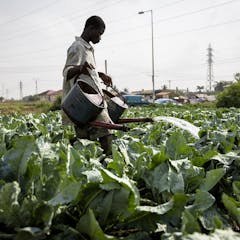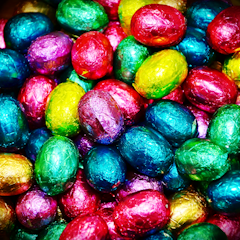
Articles on Chocolate
Displaying 1 - 20 of 84 articles

The doubling in the price of cocoa would have pushed up the price of cocoa in a typical snack bar by just six cents.

Easter is the time for chocolate. This can also make it very tricky for parents to manage their kids’ chocolate intake.

Who doesn’t love a chocolate egg or two at Easter? Here’s why a little indulgence may not do much harm.

What makes a good egg? The ethics of chocolate is complicated and often hard to decipher with confusing marketing claims on some product packaging.

The 5th Edition of the Chocolate Scorecard reveals that some retailers are lagging when it comes to selling sustainable products.

Major African cocoa plants in Côte d'Ivoire and Ghana have stopped or cut processing because they cannot afford to buy beans.

The original storyline for Road Dahl’s “Charlie and the Chocolate Factory” contained some stunning parallels to the trans-Atlantic slave trade.

Ghana and other west African cocoa growing countries must harness their combined bargaining strength to address the challenges plaguing cocoa farming.

By generating new high-resolution maps, researchers found cocoa plantations were causing far worse forest destruction in West Africa than previously thought.

Children working on family farms is often mistaken for harmful child labour.

Good things can come in chocolatey packages, but read the fine print if you want to avoid potential side effects of eating Easter treats.

Two food scientists, an entomologist, an anthropologist, a veterinarian and a historian walk into a bar (of chocolate) and tell bitter and sweet stories of this favorite treat.

Eggs have long symbolised rebirth and renewal, making them perfect to commemorate the story of Jesus’ resurrection.

The firms that do worst on the environment and human slavery in the 2023 Chocolate Scorecard are those whose mission statements extend to little more than making chocolate.

There’s a lot of interesting science behind the fermenting, roasting, grinding and melting that turns chocolate into the bars, bonbons and baked goods you know and love.

Most of us enjoy chocolate this time of year, but how many of us appreciate its historical roots and significance?

Some of our favourite Christmas treats date back to the Victorians.

Court decision protects trademarks that help consumers make informed choices.

An anthropologist writes that despite best efforts, there is no guarantee that children may not have been exploited in the production process of chocolate.

Despite the recent Kinder chocolate recall, there’s no cause for wider concern about chocolate safety.
